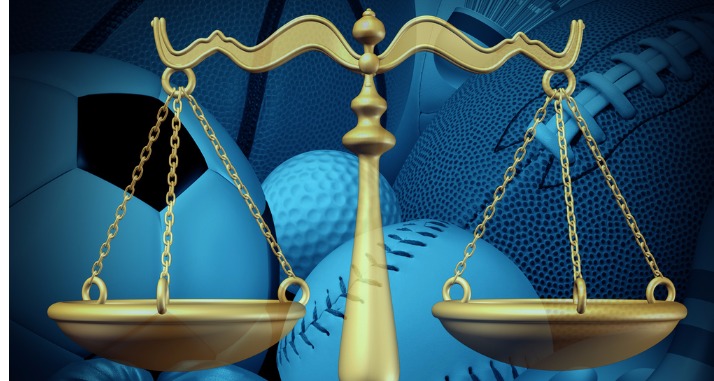
Nic Couchman, Chairman of GlobalSportsJobs’ legal partner Couchmans LLP, reflects on the latest sports law and intellectual property rights trends influencing the global sports industry in 2017.
It is a particularly fascinating time in sport at the moment, as rapidly evolving media rights models, something of a crisis in sports governance and ongoing question marks over the integrity of various sports all interact with the disruptive impact of new technologies and major new players entering the market place. The very meaning of sport and sports marketing seems to be undergoing a major adjustment, if not a revolution. If anything has surprised us in 2017, it is the sheer pace of disruption and change.
Earlier in the year, we published an article listing Couchmans “Top Ten Sports Law and IP (Intellectual Property) Themes for 2017”, see these here: article 1 & article 2 . We thought it would be interesting to update the list now that we are into the third quarter of 2017, and to see how many of our predictions were prescient and which, if any, have so far proved wide of the mark. All these topics straddle two or more of our core focus areas at Couchmans: Sport, Tech, Media and Lifestyle.

1. Social Media Rights
Predictably, the ascendancy of the social media giants and e-commerce platforms in sport has continued unabated. The sheer reach and financial power of these platforms is starting to impact the traditional sports broadcasting rights model in very tangible ways. New OTT deals, like Amazon’s successful bid in August 2017 for the UK rights to the ATP Tour (on the back of its NFL deal mentioned in our January article) are sending waves through the corridors of rights owners and broadcasters alike. Formula 1 (“F1”)has announced a highlights deal with Snapchat, after revealing a longer term plan to launch its own subscription-based OTT streaming platform. F1 has been careful to state that its new developments would not jeopardise any current or future broadcasting agreements, but that future TV deals would be shorter so that they can be reviewed on a more regular basis and the evaluation between reach and dollars would be more closely analysed. It is interesting to note however, that NBC in the USA cited the F1 OTT platform as an issue when it did not renew its agreement.
Facebook is also ramping up its sports offering, often in collaboration rather than direct competition with broadcasters (although it recently failed in its attempt to buy the domestic digital rights to IPL cricket, reportedly offering RS 39 billion), and its live streaming portfolio now includes the Mexican Liga MX and the MLB.
Whilst streaming platforms offer previously unavailable distribution opportunities for smaller sports, one of the many consequences of this rapidly emerging new model is that broadcasters may back away from bidding for some ‘second tier’ rights in order to concentrate all their financial firepower on premium, ‘must have’ rights, leaving the lower priority sports with perhaps fewer options, and the top tier with ever increasing competition for their rights.
As we recommended in our original piece, the key take away is that rights owners need to be examining their current and new agreements very carefully, and, given the sheer pace of change, as soon as possible and with the benefit of good advice. The importance of precision and ‘future proofing’ in the drafting of the definitions of rights packages is becoming ever more important.

2. Live content versus sports ‘snacking’
The English Cricket Board’s recent deal with the BBC and Sky has prioritized getting the right blend of ‘reach and revenues’, with an emphasis on introducing cricket to younger viewers, and bringing live cricket back to terrestrial television for the first time in 15 years with the launch in 2020 of the new 20/20 cricket league. ECB described the deal as their response to the challenge which all sports now face about being relevant. Part of the deal will entail clips being distributed via social media channels.
Meanwhile the Premier League won a High Court order in the UK which will help it combat illegal streaming, whereby ISP’s are now obliged to prevent people from illegally accessing streams of EPL games, undermining the value in the live rights for which Sky and BT Sport have paid £5.136billion for three seasons. The order also prevents the illicit sale and use of Kodi boxes which can facilitate illegal streaming. This comes on the back of some research which suggested there was some audience drop off in the UK for EPL games (up to 14% season on season). However, this obviously doesn’t reflect the increasing international live audience and demand for EPL content and the myriad of reasons there can be for periodic reductions. If the wall to wall coverage of this summer’s transfer window alone was anything to go by, the global interest in EPL is if anything accelerating, and Sky have also reported that viewership of its mobile streaming service has surged.
The English Football League (EFL) has launched a live streaming platform (iFollow), which enables overseas fans to follow their EFL teams live, except where the match concerned has been selected by the local EFL broadcast partner. This is not hugely dissimilar to the Gaelic sports equivalent, GAAGo, which allows the Irish diaspora internationally to follow the progress of their football and hurling teams.
In the USA, Walt Disney accelerated its plans to invest further in BAMTech, the digital media and rights company spun off from MLB (Major League Baseball) Advanced Media. The move was made in the wake of continued subscriber declines for ESPN and the launch of a multi sport video streaming service from 2018. As Bob Iger said at the time of the deal ‘the media landscape is increasingly defined by direct relationships between content creators and consumers...”.
The logical consequence of this shift is that rights owners should take increasing care and control of their rights and brands. Vertical integration and DIY solutions are becoming a firm part of the landscape, increasing the possibilities for third party strategic and financial investors to ‘buy in’ to sports rights as an asset class, and for rights owners to generate capital growth value, as well as revenue value, from their rights operations.
Post script: Sports industry veterans might well remember the business models of the ill fated Worldsport.com and Sportal were based on international webcasts in an era where, unfortunately for these early pioneers, the technology could not deliver the vision.

3. Data and Live Betting
Sports data is as always a highly dynamic area, with increasing recognition from larger players as to its importance in terms of ownership, control and monetization.
The Association of European Professional Football Leagues (EPFL) brokered a deal between eight of its leagues and three commercial partners – Perform Group, Sportradar and Genius Sports – to collect and supply official data to the betting industry (a project which Couchmans worked very closely on behalf of EPFL). In September, Perform Group and LaLiga announced the creation of the LaLiga Official Data Centre. This new data centre will ensure that LaLiga uses official match data across many sectors and channels. The agreement with Perform will last for five years from the start of the 2017/18 season, and follows on from the three year inaugural data project initiated for La Liga by Couchmans in 2014.
Whilst many of the current data rights deals are with data resellers, as this market starts to mature, we foresee rights owners taking increasing control of their valuable data opportunities, and keeping more of the available margins inhouse.
The big legal news in the betting arena is perhaps that the US Supreme Court is finally looking at the question of the legalization of sports betting, with a decision expected in June 2018, at which point Congress would become involved in the process. President Trump has said he would want input on the issue of legalization from a number of people, especially after consulting the major sports leagues in the US. However, some members of Trump’s administration have taken an anti-gambling position. The advocates of legalization point to the enormous illegal betting industry already in existence, from which no tax is collected, and the benefits that would flow to sports themselves from a regulated market.

4. Governance and Regulation
A notable theme in 2017 has been the re-invention of competition formats in various sports. Nothing particularly new, perhaps, but there is evidence of a more strategic approach emerging in certain sports.
The “Hockey Pro League”, which will launch in 2019 under the auspices of the International Hockey Federation, is one such example. Reorganising the international calendar to create “stand out” and “simple and meaningful” events as part of a “predictable, regular calendar” is the objective. It is an impressive undertaking showing perhaps that international federations can have a vital and unique role in creating an innovative and harmonious solution for the global future of a sport internationally. Nevertheless, India has chosen to stay outside the competition for the time being.

5. eSports
It has been an exciting year for the eSports industry. Revenue in 2017 is projected to rise to $465m (£365m), up from $130m in 2012 and the global audience is set to reach 385m by the end of the year. The recent Dota 2 tournament, streamed by over 20m people worldwide, was the most lucrative event in eSports history. The event saw Team Liquid, owned by aXiomatic (an entertainment and sports management company whose investors include Magic Johnson and Tony Robbins) take home more than $10 million between them.
Sponsorship and investment in eSports continues to grow. Sky recently announced that the FIFA Interactive World Cup will be streamed on Sky Sports. Football clubs, such as Paris Saint-Germain, have signed squads of players in a number of different eSports this year. The rationale for this is simple: digital gaming will attract the next generation of fans (and consumers). A young person’s first interaction with a professional football club, for example, is now very likely to come through their interaction with the FIFA game. eSports present a huge opportunity to tap into a much younger market. The potential for eSports in the Olympics is under serious consideration. Watch out too for mobile gaming making an impact as both a new media channel and sports marketing and fan engagement tool.
The second part of this series can be viewed here which continues to look at Sports Law and IP trends for the year so far, including challenges to rights deals and processes, niche sports and new formats, and the influence of China.
Couchmans LLP is the UK's premier specialist sports law firm. For more information visit: www.couchmansllp.com
Give your career in sport a boost with the latest live vacancies , or create an account today and stay up to date with all the latest industry knowledge, events and jobs in sport.
Global Sports: the world’s leading specialist careers platform for the international sports industry